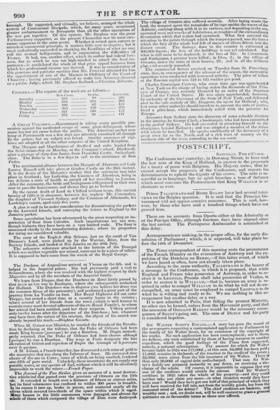The Duchess of Angouleme arrived at Vienna on the 6th,
and is lodged in the Imperial palace. She had previously paid a visit to Schoenbrunn, where she was received with the highest respect by their Majesties and by all the members of the Imperial family.
We learn from Dieppe, that the Dutchess de Berri lately passed by that town on her way to Boulogne, where she subsequently embarked for Holland. The Dutehess was in disguise (we believe her dress was the common blouse of the peasantry), and performed a great part of the journey from La Vendee on foot. Her Royal Highness did not enter Dieppe, but rested a short time at a country house in the vicinity ; -where several of her friends from the town (which is well known to contain many most devoted adherents of the ex-Royal Family), to whom her arrival had been notified, paid her their respects. Vidocq arrived cmly twelve hours after the departure of the Dutchess ; but, whatever may have been the nature of his mission, the object of his search was already beyond his reach.—Brighton Gazette.
When M. Guizot was Minister, he startled the friends of the Revolu- tion by declaring at the tribune, that the Duke of Orleans had been made King because [parceque] be was a Bourbon. M. Dupin immedi- ately retorted, that the Duke of Orleans had been chosen although Equoique] he was a Bourbon. The wags at Paris designate the late elevation of Guizot and rejection of Dupin the triumph of leparceque -over le quoique. A M. Linaut, a French traveller, has discovered a rich mine of gold in the mountains that run along the Isthmus of Suez. He conveyed nine chests of the ore to Cairo ; some of which, on being smelted, rendered one-fifth of pure metal. Unluckily, these mountains do not supply any potable water, or any species of fuel, without which it will be absolutely impossible to work the mines.—French Paper.
The Journal of the Two Sieilies gives an account of a most destruc- tive whirlwind that passed over the province of Otranto on the 10th alt. It extended in length over a distance of fifteen or sixteen miles, but its fatal vehemence was confined to within 300 paces in breadth. In its course it tore up, broke in pieces, and scattered nearly all the olives which covered two.thirds of the space within which it raged. many houses in the little communes were damaged, and almost the whole of those which composed the village of Diso were destroyed. The village of Otranto also suffered severely. After laying waste the. land, the tempest spent the remainder of its rage amidst the waves of the Adriatic, carrying along with it in its vortices, and depositing in the sea,. uprooted trees and wrecks of habitations, as trophies of the extraordinary devastation which that region had sustained; What first arrested the attention in the points through which the tempest passed, was the traces which the fury of the winds had left of masses of olives driven into the distant ocean. The damage done to the country is estimated at 300,000 ducats ; the loss of the buildings is not yet calculated. But what is still more to lie deplored, is the loss of life. In Cocummola and orfignano, 4 persons were killed ; in Diso, 2; in the village of . Otranto, under the ruins of their houses, 29; and in all the different places 63 severely wounded. The commercial letters received on Tuesday from St. Petersburg state, that, in consequence of the advance of the season, the mercantile• operations were conducted with increased activity. The price of tallow at the Russian capital was 124 to 125 roubles per pood.
Charles Dominique Carrera, who some time ago was apprehended at New York on the charge of having stolen the diamonds of the Prin- cess of Orange, was recently liberated by an ;order of the Supreme Court of the United States. He was again apprehended, however, by authority of the Governor of the State of New York, and delivered over to the safe custody of Mr. Huggens, the agent for Holland ; who, lest some other authority should interfere to prevent the ends of justice, hired a pilot-boat, which immediately sailed with the prisoner for Europe. Accounts from Sydney state the discovery of some valuable districts in the interior, by George Clark, a bushranger, who had been committed to the gaol of Sydney. He had succeeded in attaching himself to the aborigines, beyond Batharst ; and was adopted a member of the tribes with whom he travelled. He speaks confidently of the discovery of a great river far to the North, and of a rich tract of country on the northern side of the river, extending to the sea coast.


























 Previous page
Previous page